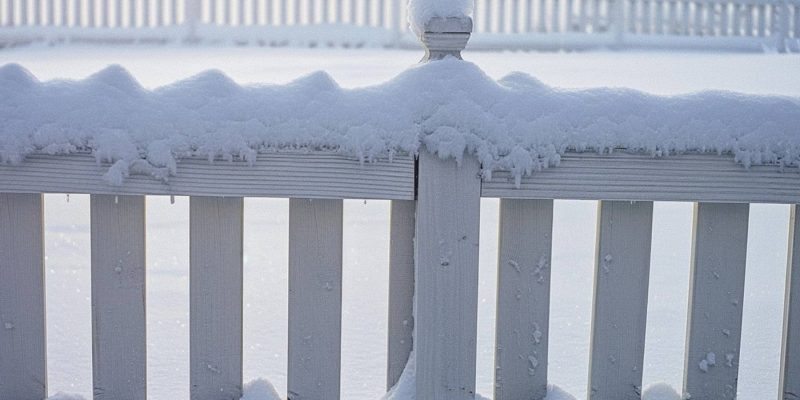Have you ever wondered if the chilly months stop us from installing new fences? Well, you’re in for a surprise! This post will dive deep into the nitty-gritty of installing fencing in winter. Get ready to discover how you can make this chilly season work to your advantage!
Feasibility of Winter Fence Installation
When it comes to setting up a new fence in winter, many folks think it’s a no-go. But here’s the scoop: in Georgia, where winters can be mild compared to the snowy North, installing a fence can absolutely be done! Our winters usually don’t see the ground freezing solid, which means professionals can work their magic without much trouble from Mother Nature.
Advantages of Installing Fencing in Winter
Winter, often overlooked for outdoor projects, offers unique benefits for installing fencing, especially in states like Georgia, where the season presents milder challenges compared to harsher northern climates. Let’s dive deeper into the advantages:
Cost Savings
Off-Peak Discounts: Fencing companies experience a downturn in demand during the colder months. To keep their teams active, they often offer discounts or special promotions. This cost-saving opportunity benefits homeowners ready to embark on fencing projects during the winter, potentially saving significantly on both labor and materials.
Material Costs: In addition to labor discounts, the cost of materials can sometimes be lower in the winter due to decreased overall demand in the construction and home improvement sectors. Taking advantage of these lower prices can lead to substantial savings on the total project cost.
Quicker Project Timelines
Faster Permit Approval: With fewer construction projects underway, local government offices are less bogged down, potentially speeding up the permit approval process for your fencing project.
Immediate Project Commencement: Unlike the spring and summer, when fencing companies might schedule projects weeks or months out due to high demand, winter often allows for more immediate start dates. This efficiency means your fence could be completed much faster, reducing the wait time to enjoy your updated property.
Less Landscape Disruption
Dormant Flora: During winter, most perennial plants and grass are dormant, minimizing the risk of damage during fence installation. This dormancy means less recovery time for your landscape, allowing it to bounce back quickly and beautifully in the spring.
Easier Ground Navigation: Without the full bloom of plants, it’s easier for installers to navigate and plan the layout of your fence. This clear access can lead to a more efficient installation process, ensuring that your fencing aligns perfectly with your landscaping vision.
Preparation for Spring Enjoyment
Ready for Spring Activities: By completing your fencing project in the winter, your outdoor space is immediately ready for enjoyment as soon as the warmer weather arrives. There’s no need to navigate construction projects during the prime time of outdoor activities.
Enhanced Privacy and Security: With your fencing in place before spring, you’ll enjoy enhanced privacy and security early in the season, making your yard a ready sanctuary for family gatherings, gardening, and leisure activities as soon as the first signs of spring appear.
Homeowners can leverage the winter months to ensure their outdoor spaces are primed for enjoyment…
By considering these advantages, homeowners can leverage the winter months not only to save on their fencing projects but also to ensure their outdoor spaces are primed for enjoyment without delay come spring.
Disadvantages and Challenges of Winter Installation
Ground Freezing
While Georgia’s winters are milder, we occasionally get those cold snaps that can harden the ground. This might make installation a tad tougher, but not impossible.
Material Handling
Cold weather can make materials like vinyl a bit more brittle. Handling with care is key during these times to prevent any damage.
Weather Delays
Unexpected winter storms can push pause on your fence installation. A little flexibility with scheduling can go a long way here.
Common Winter Installation Issues
Installing a fence in winter brings its own set of challenges, from frosty grounds to unpredictable weather. However, with the right approaches and solutions, these obstacles can be effectively managed or even turned into advantages. Here’s how professionals tackle common winter installation issues:
Techniques for Frozen Ground
Pre-Thawing the Ground: For areas experiencing occasional freezing temperatures, installers can use ground heaters or even black plastic sheets to absorb sunlight and gently thaw the ground before digging. This preparation ensures that the soil is manageable for setting fence posts.
Specialized Equipment: Professional installers might also employ equipment designed to penetrate frozen ground, such as gas-powered augers with carbide-tipped bits. These tools make it possible to create holes in fence posts without waiting for a thaw.
Strategic Timing: Scheduling digging during the warmest part of the day can make the ground easier to manage. Even in winter, the midday sun can soften the soil surface, making installation efforts more efficient.
Choosing the Right Materials
Weather-Resilient Materials: Selecting fencing materials that withstand cold temperatures without becoming brittle is crucial. Your fencing professional can recommend the best materials for your specific needs and local climate conditions.
NOTE
Metals like aluminum and certain types of wood are less affected by cold, maintaining their integrity during and after installation.
Proper Treatment and Preparation: For materials that might be more susceptible to cold, such as certain plastics or untreated wood, professionals ensure that they’re properly treated or conditioned to handle the temperature swings. This might include using specific stains, paints, or other protective coatings designed for cold-weather durability.
Planning for Weather Uncertainties
Flexible Scheduling: One key to successful winter fence installation is maintaining flexibility in scheduling. Professional installers keep a close eye on weather forecasts and plan their work around the most favorable conditions. Homeowners should also be prepared for potential shifts in project timelines to accommodate weather changes.
Protective Measures: Taking steps to protect the work area from sudden weather changes can help keep the project on track. This might include covering post holes to prevent water accumulation and freezing or using tarps to protect partially completed sections of fencing from snow and ice.
FAQs About Winter Fence Installation
Understanding the common questions homeowners have about winter fence installation can further demystify the process and set clear expectations. Here are expanded answers to some frequently asked questions:
Can Fence Posts Be Set in Frozen Ground?
Yes, with the right techniques and tools, fence posts can be securely set in frozen ground. The key is in pre-thawing the ground or using specialized drilling equipment, ensuring that the posts are anchored deeply and securely enough to withstand the cold without shifting.
How Long Does Installation Take Compared to Warmer Months?
While the actual installation work may take a similar amount of time as in warmer months, the overall project timeline can be shorter in winter due to quicker permit approvals and reduced demand for professional services. Weather conditions might introduce some variability, but with proper planning, these impacts can be minimized.
Will Winter Installation Affect the Durability of the Fence?
No, when installed correctly, a winter-installed fence is just as durable as one installed at other times of the year. Choosing appropriate materials and following best practices for cold-weather installation ensure that your fence will stand strong and look great for years to come.
By addressing these common issues and questions with informed strategies and solutions, homeowners can confidently pursue their fencing projects, even in the cooler months, knowing that their new fence will enhance their property’s value, aesthetics, and functionality.
Conclusion
Installing a fence in winter in Columbus isn’t just possible; it’s a fantastic idea. With potential cost savings, quicker timelines, and ready-to-enjoy results by spring, it’s a smart move for any homeowner. Just remember to work with professionals who know how to handle the unique challenges of winter installation, and you’ll be all set. Get ready to watch your fence go up, even as the temperature goes down!

